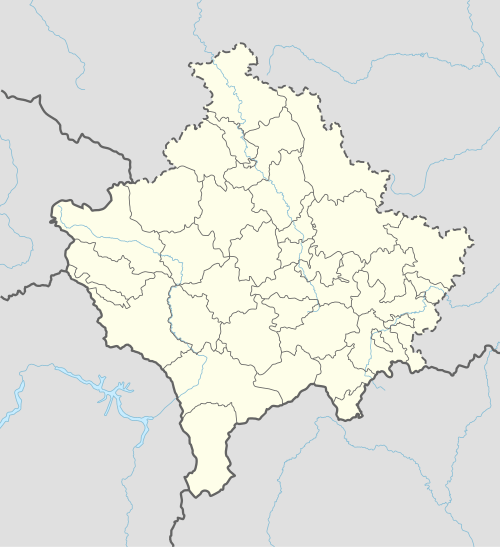Račak
Račak (Albanian: Reçak; serbian: Рачак/Račak) is a village in the Štimlje municipality of Kosovo. It became notorious in January 1999 after at least 45 villagers were killed.
Reçak | |
|---|---|
 Reçak | |
| Coordinates: 42.429296°N 21.017014°E | |
| Location | |
| District | Ferizaj |
| Municipality | Shtime |
| Population (2011)[1] | |
| • Total | 1,638 |
| Time zone | UTC+1 (CET) |
| • Summer (DST) | UTC+2 (CEST) |
Geography
Račak is a village in Kosovo, about half an kilometer southwest of Štimlje. The village lays on the Crnoljeva-mountain range. This mountain range divides the Kosovo field and Metohija.
Climate
| Climate data for Zhur/Žur (1982-2012) | |||||||||||||
|---|---|---|---|---|---|---|---|---|---|---|---|---|---|
| Month | Jan | Feb | Mar | Apr | May | Jun | Jul | Aug | Sep | Oct | Nov | Dec | Year |
| Average high °C | 2.4 | 5.1 | 10.4 | 15 | 20 | 23.7 | 26.2 | 26.4 | 22.8 | 16.3 | 8.4 | 3.7 | 15.0 |
| Average low °C | −4.1 | −2.5 | 0.9 | 4.6 | 8.7 | 11.9 | 13.5 | 13.3 | 10.3 | 6.1 | 1.4 | −2.4 | 5.1 |
| Average rainfall mm | 64 | 57 | 59 | 63 | 79 | 60 | 52 | 47 | 58 | 69 | 84 | 76 | 768 |
| Average high °F | 36.3 | 41.2 | 50.7 | 59 | 68 | 74.7 | 79.2 | 79.5 | 73.0 | 61.3 | 47.1 | 38.7 | 59.1 |
| Average low °F | 24.6 | 27.5 | 33.6 | 40.3 | 47.7 | 53.4 | 56.3 | 55.9 | 50.5 | 43.0 | 34.5 | 27.7 | 41.2 |
| Average rainfall inches | 2.5 | 2.2 | 2.3 | 2.5 | 3.1 | 2.4 | 2.0 | 1.9 | 2.3 | 2.7 | 3.3 | 3.0 | 30.2 |
| Source: [2] | |||||||||||||
Population
| Year | Population |
|---|---|
| 1948 | 613 |
| 1953 | 675 |
| 1961 | 865 |
| 1971 | 1092 |
| 1981 | 1464 |
| 1991 | 1766 |
| 2011 | 1638 |
Račak has a population of 1,638(census 2011), of whom 1629 are Albanian, one is Bosniak and eight did not answer.[4]
Reçak massacre
Prior to the summer of 1998, Račak had a population of around 2,000 people. Most of its population was displaced by fighting between regular serbian army and soldiers from the Kosovo Liberation Army (KLA) in July 1998.
By January 1999, about 350 people had returned to the village, according to the Organization for Security and Co-operation in Europe (OSCE). On 16 January 1999, OSCE monitors found the bodies of 45 people in and around the village in what became widely known as the Racak massacre. Following the incident, for which the international community blamed the Serbian military, the remaining population fled and did not return until the end of the Kosovo War in June 1999.
A memorial exists to the victims of the massacre at Reçak.[6] Kosovo annually holds a ceremony to honour the victims of the massacre.[6]
Notes
- Kosovo is the subject of a territorial dispute between the Republic of Kosovo and the Republic of Serbia. The Republic of Kosovo unilaterally declared independence on 17 February 2008, but Serbia continues to claim it as part of its own sovereign territory. The two governments began to normalise relations in 2013, as part of the 2013 Brussels Agreement. Kosovo is currently recognized as an independent state by 97 out of the 193 United Nations member states. In total, 112 UN member states recognized Kosovo at some point, of which 15 later withdrew their recognition.
References and links
- 2011 Kosovo Census results
- "Klima & Wetter in REÇAK". Climate-Data.org. Retrieved May 31, 2017.
- Tim Bespyatov. "Kosovo Census". Retrieved May 30, 2017.
- Tim Bespyatov. "Ethnic composition of Kosovo 2011". Retrieved May 30, 2017.
- Tim Bespyatov. "Religious composition of Kosovo 2011". Retrieved May 30, 2017.
- Isufi, Perparim (15 January 2020). "Kosovo Commemorates Massacre that Prompted NATO Bombing". Retrieved 16 January 2020.
- Complete analysis of the incident at Račak on Jan. 15, 1999, Yugoslavia Info
- Kosovo/Kosova As Seen, As Told - OSCE, May 1999
- "Massacre haunts returning Kosovo villagers", The Atlanta Constitution, June 15, 1999
- "Kosovo village struggles in limbo a year later", Associated Press, March 19, 2000